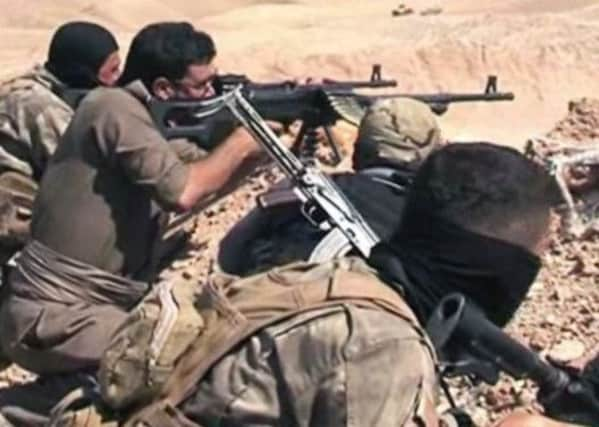Iraq: Baghdad calls on US to send in air strikes


Baghdad made the request amid reports that fighters from the Islamic State in Iraq and the Levant (Isis) had taken 75 per cent of the Baiji refinery, which powers a quarter of the country.
Foreign minister Hoshyar Zebari said a US air intervention would “break the morale” of Isis after a lightning advance over the past week. He added that Iraq’s ally, Shiite power Iran, had so far not intervened to help the Baghdad government but “everything is possible”.
Advertisement
Hide AdAdvertisement
Hide AdIn Washington, General Martin Dempsey, chairman of the joint chiefs of staff, confirmed to Congress that Iraq had sought air support. He told a hearing: “We have a request from the Iraqi government for air power. It is in our national security interest to counter Isil wherever we find them.” Isis is also known as Isil.
Isis aims to build a Sunni caliphate, which would include savage punishments for crimes, but the rebels also cover a broad spectrum of more moderate Sunnis furious at what they see as oppression by Baghdad since the fall of Saddam Hussein in 2003.
Speaking after a meeting of Arab foreign ministers in Jeddah, Saudi Arabia, Mr Zebari said air power was needed to start to roll back gains by the insurgents, who have captured large amounts of weaponry from the Iraqi army during their advance.
He added: “I explained to our Arab brothers in the meeting that Iraq officially requested the United States’ help, according to the strategic agreement between Iraq and the United States of America, to direct air strikes [at] some of the group’s vital targets to break this state of morale now present – and to begin the operation of defeating them.”
Mr Zebari criticised what he said was a lack of a condemnation by Saudi Arabia, regarded as a hardline Sunni state, of massacres by Isis.
“There was no reference to the slaughter, the bloodletting and the killing,” Mr Zebari said of the kingdom’s previous statements.
Isis fighters descended on the Baiji refinery on Tuesday night and fought yesterday to take the huge plant. It was not clear who was in control last night.
An official speaking from inside the refinery, which is north of Baghdad, told a news website: “The militants have managed to break in to the refinery.
Advertisement
Hide AdAdvertisement
Hide Ad“Now they are in control of the production units, administration building and four watch towers. This is 75 per cent of the refinery.”
However, the government denied the site had fallen.
A counter-terrorism spokesman insisted forces were still in control and had killed 50 to 60 fighters and burned six or seven insurgent vehicles after being attacked from three directions.
There was no independent confirmation either of his claims or those of the Iraqi military’s retaking neighbourhoods in the city of Tal Afar.
Baiji’s output is used for domestic consumption, including petrol and fuel for power stations. Petrol-pump and electricity shortages and possible blackouts would place further pressure on the embattled Iraqi prime minister Nouri al-Maliki. In a televised address, Mr al-Maliki struck an optimistic tone and vowed to teach the attackers a “lesson” – even though Iraqi soldiers abandoned their posts in the wake of the initial militant offensive.
He added: “We have now started our counter-offensive, regaining the initiative and striking back.”
Despite the request from Baghdad, reports in the US last night suggested president Barack Obama has shifted his focus away from airstrikes, largely because of a lack of clear targets. Isis is constantly on the move and the whereabouts of its leaders, such as Abu Bakr al-Baghdadi, are not known.
The CIA and other agencies are assembling detailed dossiers known as “targeting packages”, reports said. These amount to profiles of insurgent commanders, including as much day-to-day information as can be gathered about their location, movements, associates and communications.
The packages can be used to target subjects for drone strikes or other military action, although they can also be used for non-lethal purposes, current and former officials said.
Advertisement
Hide AdAdvertisement
Hide AdAl-Baghdadi himself was previously held in custody by the US military in Iraq for four years.
Mr Obama summoned senior politicians to the White House yesterday to discuss the collapsing security situation. Ahead of the meeting, senate majority leader Harry Reid said America had no business sending troops into the midst of what he called Iraq’s civil war.
“It’s time for the Iraqis to resolve it themselves,” said Mr Reid, a Democrat. He added: “After a decade of war, the American people have had enough.”
The campaign by the al-Qaeda-inspired Isis has again raised the spectre of the sectarian warfare that nearly tore the country apart in 2006-7. The violence that followed the 2003 US-led invasion now haunts those trying to decide how to respond.
Meanwhile, diplomats also fear Isis may have seized some 100 foreign workers.
The Indian government said 40 Indian construction workers have been seized near Iraq’s second-largest city, Mosul, which Isis and allied Sunni fighters captured last week. Roughly 10,000 Indian citizens work and live in Iraq, but only about 100 in insecure areas such as Mosul.
The Turkish foreign ministry also said its diplomats were investigating reports that militants grabbed 60 foreign construction workers, including some 15 Turks, near the northern Iraqi oil city of Kirkuk.
Beiji is 155 miles north of the capital, Baghdad, to which Isis forces are believed to be heading. Even if Iraq’s US-trained soldiers abandon their posts, Isis is likely to encounter substantial resistance from fanatical Shia fighters, like the Mahdi Army.